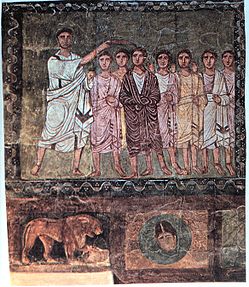
In Abrahamic religions, a messiah or messias (Hebrew: מָשִׁיחַ, romanized: māšīaḥ; Greek: μεσσίας, messías; Arabic: مسيح, masīḥ; lit. 'anointed one') is a saviour or liberator of a group of people. The concepts of mashiach, messianism, and of a Messianic Age originated in Judaism,[1][2] and in the Hebrew Bible, in which a mashiach is a king or High Priest traditionally anointed with holy anointing oil.
In Judaism, Ha-mashiach (המשיח, 'the Messiah'),[3][a] often referred to as melekh ha-mashiach (מלך המשיח, 'King Messiah'),[5] is a fully human non-deity Jewish leader, physically descended via a human genetic father of an unbroken paternal Davidic line through King David and King Solomon. He will accomplish predetermined things in a future arrival, including the unification of the tribes of Israel,[6] the gathering of all Jews to Eretz Israel, the rebuilding of the Temple in Jerusalem, the ushering in of a Messianic Age of global universal peace,[7] and the annunciation of the world to come.[1][2]
The Greek translation of Messiah is Khristós (Χριστός),[8] anglicized as Christ. It occurs 41 times in the Septuagint and 529 times in the New Testament.[9] Christians commonly refer to Jesus of Nazareth as either the "Christ" or the "Messiah", believing that some messianic prophecies were fulfilled in the mission, death, and resurrection of Jesus and that he will return in a second coming to fulfill the rest of messianic prophecies. Moreover, unlike the Judaic concept of the Messiah, Jesus Christ is considered the Son of God, although in the Jewish faith the King of Israel was also metaphorically called the Son of God.
In Islam, Jesus (Arabic: عيسى, romanized: Isa) is held to have been a prophet and the Messiah sent to the Israelites, who will return to Earth at the end of times along with the Mahdi, and defeat al-Masih ad-Dajjal, the false Messiah.[10]
In Ahmadiyya theology, these prophecies concerning the Mahdi and the second coming of Jesus are believed to have been fulfilled in Mirza Ghulam Ahmad (1835–1908),[11] the founder of the Ahmadiyya Movement, wherein the terms Messiah and Mahdi are synonyms for one and the same person.[12]
In controversial Chabad messianism,[b] Yosef Yitzchak Schneersohn (r. 1920–1950), sixth Rebbe (spiritual leader) of Chabad Lubavitch, and Menachem Mendel Schneerson (1902–1994), seventh Rebbe of Chabad, are Messiah claimants.[13][14][15][16]
- ^ a b Schochet, Jacob Immanuel. "Moshiach ben Yossef". Tutorial. moshiach.com. Archived from the original on 20 December 2002. Retrieved 2 December 2012.
- ^ a b Blidstein, Prof. Dr. Gerald J. "Messiah in Rabbinic Thought". Messiah. Jewish Virtual Library and Encyclopaedia Judaica 2008 The Gale Group. Archived from the original on 16 May 2022. Retrieved 2 December 2012.
- ^ Telushkin, Joseph. "The Messiah". The Jewish Virtual Library Jewish Literacy. NY: William Morrow and Co., 1991. Reprinted by permission of the author. Archived from the original on 27 May 2022. Retrieved 2 December 2012.
- ^ "The Jewish Concept of Messiah and the Jewish Response to Christian Claims – Jews For Judaism". jewsforjudaism.org. Jews For Judaism. Archived from the original on 16 September 2016. Retrieved 31 August 2016.
- ^ Flusser, David. "Second Temple Period". Messiah. Encyclopaedia Judaica 2008. The Gale Group. Archived from the original on 16 May 2022. Retrieved 2 December 2012.
- ^ Megillah 17b–18a, Taanit 8b
- ^ Sotah 9a
- ^ "Etymology Online". Archived from the original on 12 January 2012. Retrieved 4 February 2008.
- ^ "G5547 - christos - Strong's Greek Lexicon (Tr)". Blue Letter Bible.
- ^ "Muttaqun OnLine – Dajjal (The Anti-Christ): According to the Qur'an and Sunnah". Muttaqun.com. Archived from the original on 2 July 2014. Retrieved 9 November 2012.
- ^ Cite error: The named reference
askislamorgwas invoked but never defined (see the help page). - ^ Cite error: The named reference
rororgwas invoked but never defined (see the help page). - ^ Cite error: The named reference
SHandelmanwas invoked but never defined (see the help page). - ^ Cite error: The named reference
ASteinsaltzwas invoked but never defined (see the help page). - ^ Cite error: The named reference
DHornwas invoked but never defined (see the help page). - ^ Cite error: The named reference
ALichtensteinwas invoked but never defined (see the help page).
Cite error: There are <ref group=lower-alpha> tags or {{efn}} templates on this page, but the references will not show without a {{reflist|group=lower-alpha}} template or {{notelist}} template (see the help page).